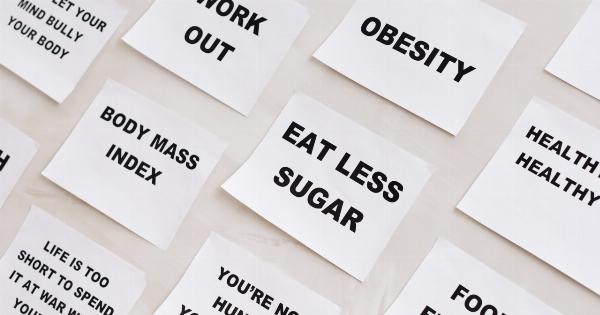Healthy eating habits are essential for maintaining a balanced diet and overall well-being. However, many of us struggle with controlling our eating habits, whether it’s binge eating, emotional eating, or mindless snacking.
Fortunately, with the right approach and strategies, it is possible to regain control of our eating habits and develop a healthier relationship with food. In this article, we will explore five effective tips that can help you in your journey towards better eating habits.
1. Practice Mindful Eating
Mindful eating involves paying full attention to your eating experience, including the taste, smell, and texture of food, as well as your hunger and fullness cues.
By practicing mindful eating, you can become more aware of your body’s signals and make conscious choices about what and how much to eat.
Some tips to practice mindful eating include:.
- Eating slowly and savoring each bite
- Avoiding distractions such as TV or electronic devices while eating
- Listening to your body’s hunger and fullness cues
- Appreciating the flavors and textures of the food
2. Plan Your Meals
Planning your meals in advance can help you make healthier choices and avoid impulsive eating. By having a plan in place, you are less likely to reach for unhealthy options or rely on convenience foods.
Here are some tips for meal planning:.
- Set aside time each week to plan your meals and create a grocery list
- Include a variety of fruits, vegetables, whole grains, and lean proteins in your meals
- Prepare and pack your meals in advance to prevent reaching for unhealthy options
- Consider batch cooking and freezing meals for busy days
3. Manage Your Environment
The environment plays a significant role in our eating habits. By making small changes to your surroundings, you can make healthier choices more easily.
Here are some ways to manage your environment:.
- Keep a clean and organized kitchen to promote healthy cooking and eating
- Stock your pantry and fridge with nutritious foods and avoid unhealthy snacks
- Avoid keeping trigger foods in your house, or limit them to small portions
- Choose smaller plates and bowls to control portion sizes
4. Identify and Manage Triggers
Emotional eating and food cravings are often triggered by certain emotions or situations. Identifying these triggers and finding alternative ways to cope can help you break the cycle of emotional eating.
Some tips for managing triggers include:.
- Keep a food diary to track your emotions and identify patterns
- Find alternative activities to manage stress or boredom, such as exercise or hobbies
- Practice relaxation techniques like deep breathing or meditation
- Reach out to a supportive friend or family member when you need to talk
5. Seek Professional Help if Needed
If you find it challenging to control your eating habits on your own, don’t hesitate to seek help from a healthcare professional or registered dietitian. They can provide guidance, support, and personalized advice tailored to your specific needs.
Remember, developing healthier eating habits takes time and effort. Be patient with yourself and celebrate small victories along the way.
By implementing these tips and staying consistent, you can regain control of your eating habits and achieve your nutrition goals.






























